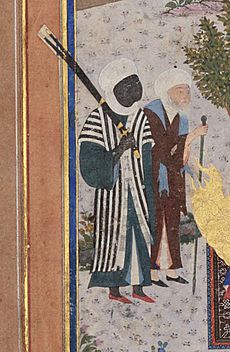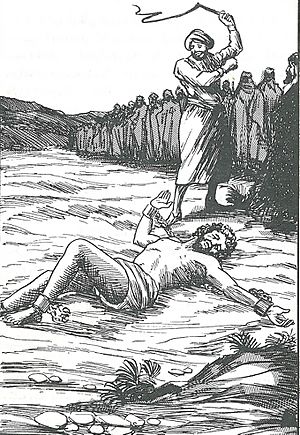Bilal ibn Rabah facts for kids
Quick facts for kids Bilāl ibn RabāḥArabic: بِلَال بِن رَبَاح |
|
|---|---|
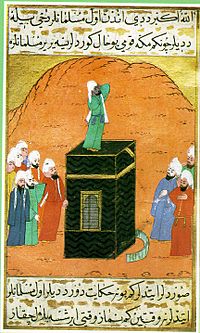
An Islamic miniature from Siyer-i Nebi (16th century, Ottoman Empire), depicting Bilal giving the call to prayer
|
|
| Born | 580 CE |
| Birthplace | Mecca, Hejaz |
| Known For | Being a prominent companion of Muhammad and the first mu'azzin in Islam |
| Occupation | Muezzin and Secretary of Treasure of The Islamic State of Medina |
| Title | Sayyid al-Muʾaḏḏin |
| Died | March 2, 640 (aged 59–60) CE |
| Father | Rabah |
| Mother | Hamamah |
| Wife |
|
| Religion | Islam |
Bilāl ibn Rabāḥ (Arabic: بِلَال بِن رَبَاح), born around 580 CE and passing away in 640 CE, was a very important person in early Islam. He was one of the most trusted friends and followers of the Islamic prophet Muhammad.
Bilal was born in Mecca and was once a slave from Abyssinia. He became famous for his amazing voice. Muhammad chose him to be the very first mu'azzin in history. A muezzin is someone who calls Muslims to their prayers five times a day. Bilal died when he was about 60 years old.
Contents
Bilal's Early Life
Bilal ibn Rabah was born in Mecca in the Hejaz region around the year 580 CE. His father, Rabah, was a slave. His mother, Hamamah, was believed to be a princess from Abyssinia. She was captured and became a slave after a big event called the Year of the Elephant.
Because Bilal was born into slavery, he had to work for his master, Umayyah ibn Khalaf. Bilal was a hard worker. He was even trusted with the keys to the idols in Arabia. However, because of his background and the way society was at the time, Bilal could not achieve a high position.
How Bilal Looked
People who wrote about Bilal described him as handsome and impressive. He had dark brown skin, bright eyes, a nice nose, and clear skin. He also had a deep, beautiful, and strong voice. He had a thin beard on his cheeks. People saw him as wise and full of dignity.
Another writer, William Muir, said Bilal was tall, dark, and had African features with bushy hair. He also mentioned that some powerful people in the Quraysh tribe looked down on Bilal. They even called him "Ibn Sawda," which means "son of the black woman."
Becoming a Muslim
When Prophet Muhammad announced his message of Islam, Bilal was one of the first people to believe. He stopped worshipping idols and became a Muslim.
Bilal's Difficult Times
When Bilal's master, Umayyah ibn Khalaf, found out he had become a Muslim, he started to hurt Bilal. Umayyah, encouraged by Abu Jahl, tied Bilal up. He dragged him around Mecca while children made fun of him. But Bilal refused to stop being a Muslim. He kept saying, "Ahadun Ahad," which means "God is one."
Umayyah was very angry that Bilal would not give up his faith. He ordered Bilal to be whipped and beaten. Bilal was spread out on the hot desert sand, with his arms and legs tied to stakes. Even then, Bilal would not change his mind. Umayyah then ordered a heavy, hot rock to be placed on Bilal's chest. But Bilal stayed strong in his belief and kept saying, "Ahad Ahad."
Bilal Becomes Free
News of Bilal's suffering reached some of Prophet Muhammad's followers. They told the Prophet what was happening. Muhammad sent Abu Bakr, one of his closest companions, to help Bilal. Abu Bakr bought Bilal and set him free. This act of setting a slave free is called manumission.
Many years later, when the Muslim armies were preparing for a journey to Levant (a region in the Middle East), Bilal asked Abu Bakr for permission to leave Medina. He wanted to join the fight for Islam, known as Jihad.
Bilal in Medina
In the new Islamic state of Medina, Bilal became a very important member of the Muslim community. He took on significant roles.
The Call to Prayer (Adhan)
Prophet Muhammad chose Bilal to be the first mu'azzin. A muezzin is the person who recites the Adhan, which is the call to prayer.
Most mosques around the world use the Adhan as taught in the Sunni tradition. It is said that a companion named Abdullah ibn Zaid had a dream. In his dream, an angel taught him the words of the Adhan. The Prophet Muhammad then told Abdullah to teach these words to Bilal. This was because Bilal had a very loud and clear voice. Another companion, Umar ibn al-Khattab, also had a similar dream.
Taking Care of the Treasury
Bilal became very important in the Muslim community in Medina. Prophet Muhammad made him the minister of the Bayt al-Mal, which was like the treasury or public fund. In this role, Bilal was in charge of giving money to people who needed help. This included widows, orphans, travelers, and others who could not support themselves.
Bilal in Battles
Bilal took part in important battles during Prophet Muhammad's time. One of these was the Battle of Badr. In this battle, Muhammad's forces included brave companions like Ali ibn Abi Talib, Hamza ibn Abd al-Muttalib, Abu Bakr, and Umar.
Bilal's Strong Faith
Bilal was one of the special companions of Prophet Muhammad. It is said that he was promised a place in Paradise. There is a story that his footsteps could be heard in Paradise, showing how highly he was regarded for his strong faith.
After Prophet Muhammad's Death
After Prophet Muhammad passed away in 632 CE, Bilal made a difficult decision. He did not immediately give his bay'ah (oath of allegiance) to Abu Bakr, who became the first leader (Caliph) after Muhammad.
It is said that Umar ibn al-Khattab asked Bilal why he was not supporting Abu Bakr, especially since Abu Bakr had set him free. Bilal replied that if Abu Bakr had freed him for the sake of Allah, then Allah would reward him. But if he had freed him for his own service, Bilal was ready to serve him. However, Bilal stated that he would not give his allegiance to someone whom Prophet Muhammad had not appointed as his leader.
Another account says Bilal told Abu Bakr: "If you freed me for yourself, then make me a captive again. But if you freed me for Allah, then let me go in the way of Allah." After this, Abu Bakr allowed Bilal to leave Medina and go for Jihad. Bilal then moved to Syria.
Bilal's Passing
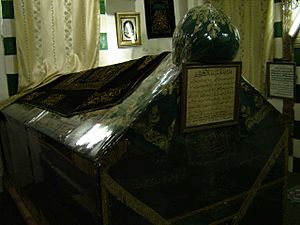
Bilal passed away in Damascus. Most historians believe he died around 640 CE, when he was just over sixty years old. He is believed to be buried in the Bab al-Saghir cemetery in Damascus. There is also another place in Amman, Jordan, that some believe is his burial site.
When Bilal was close to death, his wife was very sad. She cried, saying, "What a painful time!" But Bilal had a different view. He said, "No, what a happy time! Tomorrow, I will meet my beloved Muhammad and his companions!"
Bilal's Lasting Impact
The family of Bilal ibn Rabah is said to have moved to Ethiopia in East Africa. The royal family of Mali in West Africa also says they are related to him.
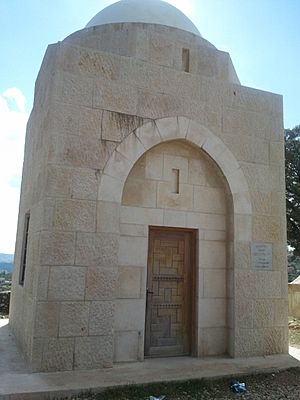
Even though there are some small differences in the stories about Bilal's life, his importance is clear. Muezzins, especially in Turkey and Africa, look up to him as the first person to do their job. Bilal's story is often used to show that in Islam, people are not judged by their nationality, social status, or race. Instead, they are judged by their Taqwah, which means their devotion and closeness to God.
In 1874, Edward Wilmot Blyden, an African-American writer, wrote about Bilal. He said that the beautiful Adhan, which calls millions of people to prayer every day, was first spoken by a Black man named Bilal. Muhammad chose Bilal to be the first Muezzin after having a dream. Blyden noted that even Alexander the Great is not as well-known in Asia as this respected Black man.
Images for kids
See also
- List of non-Arab Sahabah
- Zayd ibn Harithah
- Keita Dynasty
- List of expeditions of Muhammad
- Bilal: A New Breed of Hero, a 2015 animated film about Bilal's life.
- In Spanish: Bilal ibn Rabah para niños
 | Mary Eliza Mahoney |
 | Susie King Taylor |
 | Ida Gray |
 | Eliza Ann Grier |


